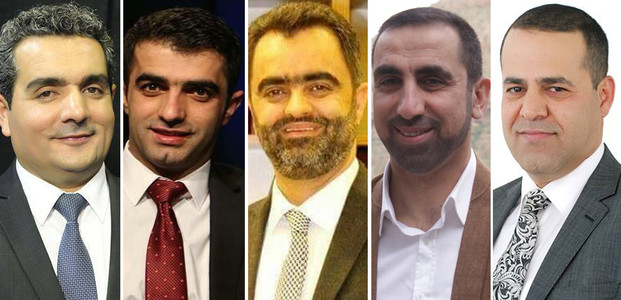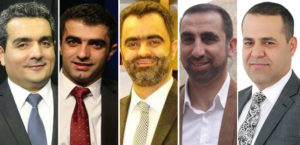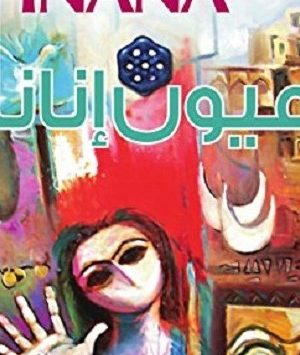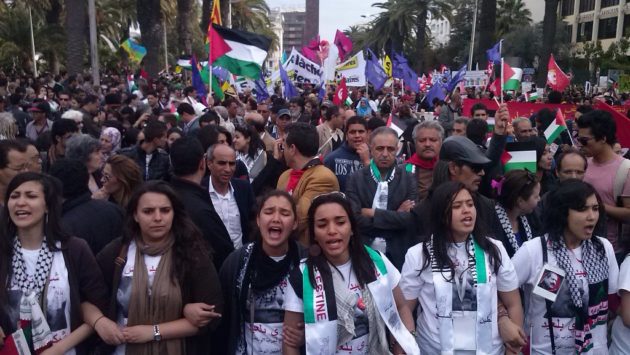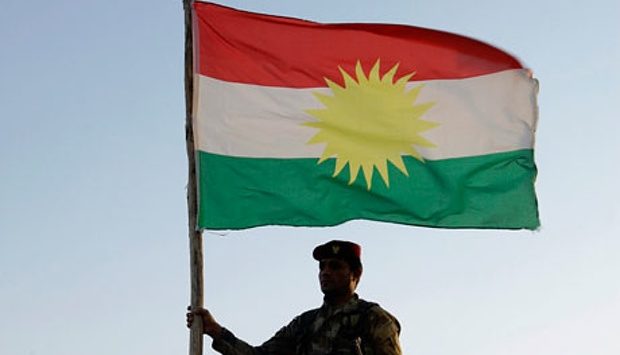Guardians Of The Galaxy: Iraqi Kurdistan’s ‘Superstar’ Politicians Fight Corruption – But Do They Do Any Good?
Political celebs, from left to right: Farsat Sofi, Ali Hama Salih, Soran Omar, Sherko Jawdat, Izzat Saber.
Maaz Farhan :Niqash
A handful of Iraqi Kurdish politicians have become well-known as anti-corruption crusaders and disloyal dissenters. But can these newly-minted political celebrities actually make a difference?
Many locals in the semi-autonomous northern region of Iraqi Kurdistan have become increasingly cynical about politics since their Parliament was first formed 24 years ago. They believe that their MPs are really only in the job for the money, privilege and power it brings, not because they want to make things better for voters. That’s why, cynical Kurdish voters will tell you, the MPs just follow their party’s orders.
However, over the past few years, there has been a handful of politicians who have started breaking formation. And for this reason, they have become what may best be described as Iraqi Kurdistan’s “celebrity politicians”. They are known for their activism and their opposition to standard loyalties. Because of this, many Kurdish locals, who wouldn’t normally care, recognize those MPs’ faces and names.
Izzat Saber: If I wasn’t an MP I would probably be in prison.
These superstars of Kurdish politics are Ali Hama Salih, a member of the anti-corruption Change movement, Soran Omar of the Islamic Group of Kurdistan, Izzat Saber of the Patriotic Union of Kurdistan, Sherko Jawdat of the Kurdistan Islamic Union and Farsat Sofi from the region’s largest party, the Kurdistan Democratic Party. Their loud voices and critical viewpoints can be heard clearly, particularly at this time, when Kurdish politics have come to a virtual standstill, thanks to ongoing wrangling about who should be Iraqi Kurdistan’s president.
Salih is probably one of the best known of the group. He was a television presenter before he became a politician and as a TV host he would often talk about corruption in Iraqi Kurdish politics. As a result of this, he won the highest number of votes for any candidate standing in the region’s 2013 elections.
As a politician Salih has continued to fight corruption, filing about 80 different law suits through the Integrity Commission, an official body charged with rooting out corrupt practices and politicians. Salih has also had about ten law suits filed against him.
“The current authorities no longer have any basis upon which they can rule this region,” Salih told NIQASH. “It’s a group of people who only work in their own interests. It’s our moral responsivity to confront these people and bring down this castle of corruption.”
Salih’s party, the Change movement, is a sworn enemy of the Kurdistan Democratic Party, or KDP. But Salih doesn’t only criticise the KDP when it comes to the current political stalemate in Iraqi Kurdistan. “The KDP bears the primary responsibility,” Salih says. “But the other four parties don’t have a clear position either. If they don’t take part in politics and power, how can they compete with the KDP?”
Salih often works together with another of Iraqi Kurdistan’s rising stars, Soran Omar of the Islamic Group of Kurdistan. The two have become good friends.
The role of MPs should be to pass laws and hold the government accountable as well as represent the people, Omar told NIQASH. “Under these very difficult conditions, we should be confronting corruption and talking about injustice as well as human rights violations very loudly,” he said.
“There are supposed to be 111 MPs representing the Kurdish people,” Omar continues. “But the people are in a bad way and the government is corrupt. Within the parties there are not enough people who voice opposition,” Omar noted, adding that he hoped that in the future more MPs would join him and Salih. “We can only do what we can do.”
“I am not against any particular party,” Sherko Jawdat, who represents the Kurdistan Islamic Union, explained. “But I do support reform and I want to expose corruption. We should be doing this in a professional and rational way though, and with courage. I also support civil pressure on the government,” he says, referring to the protests that have been staged by teachers and other civil servants in Iraqi Kurdistan recently because of the financial crisis in the region.
My criticisms are just the attempts of one individual. But it’s better than standing there, doing nothing.
It may well be easier for Salih and Omar to present contrary points of view. After all, their parties have been in the opposition for years. Far more unusual, is a dissenting voice inside one of Iraqi Kurdistan’s two most powerful parties, which have basically been sharing power in the region for decades.
Izzat Saber is a member of one of these, the Patriotic Union of Kurdistan, or PUK. And he says he soon plans to reveal how the local government plunders the region’s natural resources; Iraqi Kurdistan produces oil and gas, among other things.
“If I wasn’t an MP I’d probably be in prison,” he told NIQASH. “To my mind, Parliament has two roles. They should pass laws and monitor the government. If I didn’t perform those tasks I would lose respect for myself. I have spoken about corruption many times and many in the government did not like that – even though the things I said, serve to make the government better,” he continues. “I have also been accused of disloyalty. But this has not stopped me.”
The members of the region’s most powerful party, the Kurdistan Democratic Party, or KDP, are even less likely to speak out. One of the MPs that does go against his party is Farsat Sofi. For this he has gained the respect of his own party’s supporters and, somewhat surprisingly, of other parties’ supporters too.
“Power in this region was built up on an erroneous basis from the beginning,” Sofi says. “There is corruption and wastage of public funds in so many areas. I’ve debated a lot on these issues. And my criticisms are just the attempts of one individual,” he admits. “But it’s better than standing there, doing nothing.”
Of course, there are also other MPs inside the Iraqi Kurdish parties who have voiced critical opinions. But they are not as well-known as these five. Still there’s also a lot of doubt about what anyone can do about corruption in Iraqi Kurdish politics, even if they are becoming celebrities in the process.
“In fact there are many other politicians who are prepared to debate and voice opposition,” says Asso Ali, a local political strategist who has worked with the PUK and the Change movement in the past. “But they do this within limits, so that what they say can be used as propaganda or to attract voters’’ attention.”
“The attempts made so far have not really been very effective,” Ali continues. “They have not had much impact. These MPs may all have a similar point of view when it comes to corruption but the fact they belong to different parties means that they can never truly unite. Their parties wouldn’t allow it. If these MPs do eventually have any impact, it would be reflected in the changing position of their party as a whole.”

